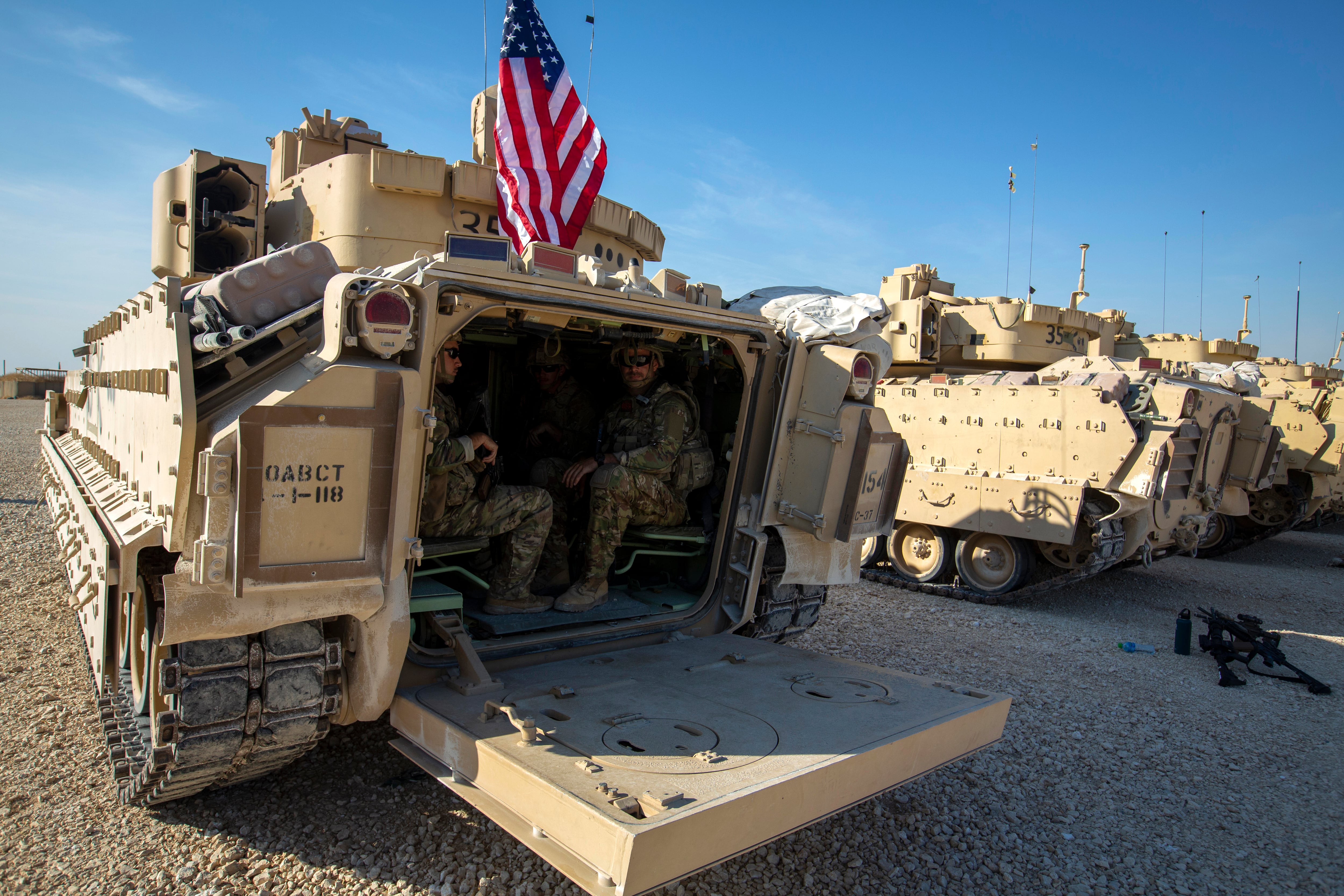The Islamic State is expected to revamp its operations in Syria and is predicted to grow its capability to attack the West — now that U.S. and allied-Syrian Democratic Forces’ operations to combat ISIS in Syria have been curtailed, according to a new report.
As a result, the Sunni jihadi group will likely have the “time and space” to target the west and regroup around the world, the Defense Intelligence Agency told the DoD Inspector General.
DIA’s assessment is that ISIS is “likely to exploit the reduction in counterterrorism pressure to reconstitute its operations in Syria and expand its ability to conduct transnational attacks,” the Pentagon’s inspector general said in a report released Nov. 19.
Without counterterrorism pressure, the DIA anticipates ISIS will have a better opportunity to cultivate its covert networks, the report said.
The Trump administration announced on Oct. 6 that U.S. troops would be pulled from northern Syria and essentially provided an opening for Turkey to attack the Kurdish People’s Protection Unit, who is the cornerstone of the Syrian Democratic Forces and is considered as a branch of a designated terrorist organization by Turkey.
The report claimed Turkey’s incursion had a ripple effect on Operation Inherent Resolve’s anti-ISIS operations because it impacted the U.S.’s relationship with the Kurds and Syrian Democratic Forces that have worked with the U.S. to counter ISIS, and also influenced the “control of territory in northeastern Syria.”
Specifically, the DIA noted that Syrian regime forces and Russian forces subsequently “moved in to fill the void created by departing U.S. forces.” Just last week, Russian Defence Ministry’s Zvezda station claimed Russia was setting up a helicopter base in the Kurdish-controlled city of Qamishli in northern Syria.
That, coupled with a drawdown of U.S. forces in the region raises some red flags about the SDF’s ability counter ISIS, per the report.
“These developments raised concerns that the SDF would no longer be willing or able to continue operations against ISIS as its fighters focused attention on confronting the Turkish incursion,” the report said.
Citing the DIA, the report predicted that ISIS will have the “‘time and space’ to target the West” and back its offshoots and networks around the world. Likewise, the DIA anticipates ISIS will seek to take back control in some Syrian population centers as it attempts to spread its worldwide network.
Additionally, the report claimed that the death of ISIS leader Abu Bakr al-Baghdadi “would likely have little effect on the ability of ISIS to reconstitute.” President Donald Trump said al-Baghdadi, who was killed on Oct. 26, detonated his suicide vest in a dead-end tunnel after U.S. forces and military canines trapped him.
“Open-source analysis also stated that al-Baghdadi’s death was a significant blow to ISIS but would not likely end the ISIS threat,” the report said.
Katherine Zimmerman, a resident fellow at the American Enterprise Institute and an adviser to AEI’s Critical Threat Projects, told Military Times that al-Baghdadi’s death has had little influence on allegiance toward ISIS.
While his status as top commander was significant for overall leadership, she noted that al-Baghdadi’s years in hiding meant that operational commanders who served on the ground were the ones actually calling the shots and working to recruit new members and leaders as part of day to day operations.
Ultimately, Zimmerman said it’s important to remove top leaders and ideologues but argued it’s not sufficient in eliminating the threat form. Instead, Zimmerman said the U.S. needs to focus on the conditions that led to the birth of ISIS.
“At the end of the day, the U.S. needs to recognize it’s going to be soft power, and government’s issues and socioeconomic issues that will defeat the Islamic State and groups like it, and not the hard power and counterterrorism efforts,” Zimmerman said.
“That’s a lesson that we still get to learn,” she added. “What that looks like is even more unclear.”
The DoD Inspector General report coincides with Turkey’s Ministry of National Defence tweeting Sunday how Turkey is the only member of NATO to go “toe to toe” against the Islamic State, despite the fact that OIR was established in 2014 specifically to formalize military operations against ISIS in Syria and Iraq.
The U.S.-led coalition has conducted more than 34,000 airstrikes in Syria and Iraq since it was established in 2014. With the exception of the raid to take down al-Baghdadi, the coalition did not conduct any anti-ISIS strikes in Syria in September and October.
When contacted by Military Times, OIR spokesman Army Col. Myles Caggins III declined to comment on Turkey’s tweet but said that OIR remains committed to wiping out ISIS.
Since Turkey’s initial incursion, the Trump administration has slightly reversed course and Secretary of Defense Mark Esper announced last week that roughly 600 U.S. troops would remain in Syria as part of the ongoing effort to wipe out ISIS and to safeguard oil from ISIS.
“All in-country, 600-ish,” Esper told reporters en route to Seoul on Nov. 14. "'-Ish’ because it changes on a daily basis, people moving in and out, doing different things, and…we’re still withdrawing folks from Kobani, and that’ll take another week or so, I think.”
Military Times reporter Shawn Snow contributed to this report.




